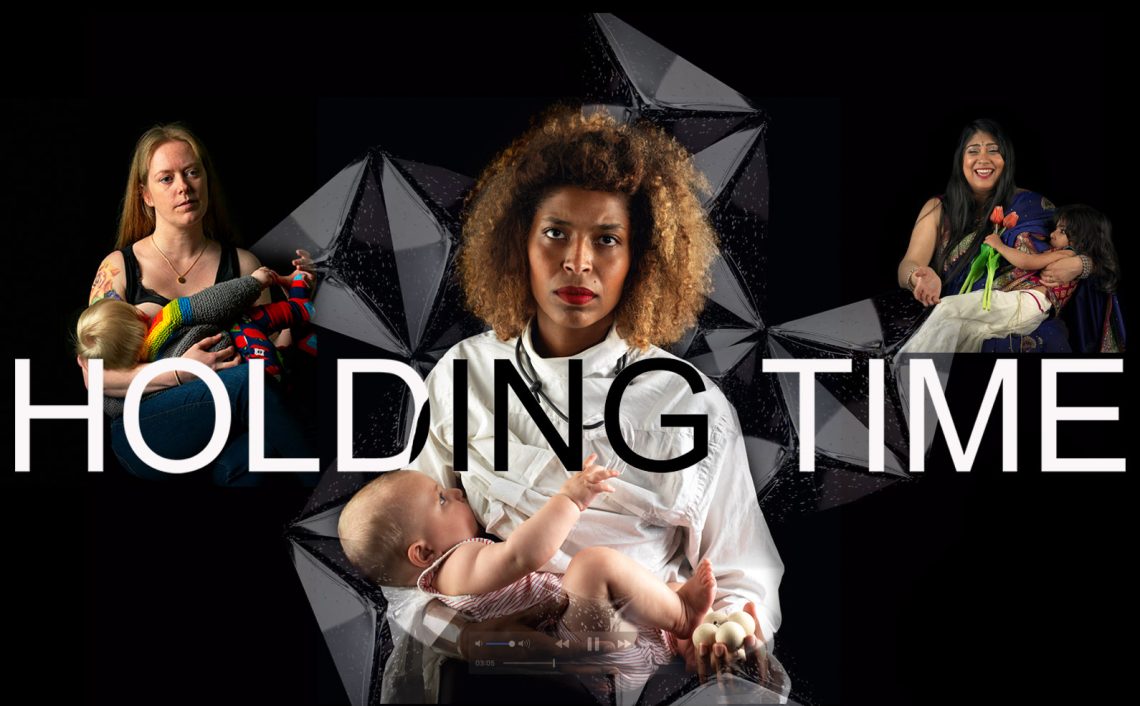Podcasts are a great way to listen in to conversations you may otherwise never hear. In this new Season of…
Holding Time Chair Unveiling
Bradford Mothers’ Voices Take to the Streets in the ‘Holding Time Milk Line’
The Holding Time Milk Line celebrates Bradford mothers through an immersive walking trail of art, poetry, and storytelling. Created by artist Lisa Creagh for Baby Week Bradford, the trail links Family Hubs and green spaces, inviting families to listen, reflect, and connect with local stories of motherhood, feeding, and wellbeing.
Bradford Podcast | Creativity and Wellbeing Week
The Bradford Podcast amplifies mothers’ diverse voices on breastfeeding, adoption, milk donation, birth trauma, and cultural traditions—part of Holding Time’s wider Creative Health programme in Bradford.
Breastfeeding a Neurodivergent Child
I’ve come to realise why it was hard at times in my breastfeeding journey and a lot of this relating to being neurodivergent. As we see an increase in awareness around hidden disabilities, I hope other mums can feel confident to seek help if they’re finding it hard to breastfeed/parent a child with additional needs.
Winner 2024 | Holding Time Arts & Health
We are proud to announce that Holding Time received the Royal Society for Public Health’s Health & Wellbeing Award 2024 for its pioneering arts and health work supporting breastfeeding, mothers, and NHS partners.
Holding Time Chair Unveiling
Unveiling: 12-3pm Friday November 15th, 1.00PM Bowling Park Wild area, Bradford I am always looking for ways to reach more…
Writing for Wellbeing
I’m Rachel New, a broadcaster, writer and workshop facilitator. I’ve been running creative and therapeutic writing workshops for breastfeeding mothers,…
Cultural memories of breastfeeding: race, class and migration
Anna Horn writes about the challenges of breastfeeding her first child. Her unique perspective an African American offers valuable insight of the complexities around breastfeeding for black women here and abroad.
Halton Family Hubs
Holding Time moves into the new Family Hub Network in Halton with creative writing workshops, portraits across seven venues and an audio tour around the beautiful walled garden at Norton Priory
The Podcast
Gathering together key conversations from the Holding Time project about motherhood, breastfeeding, history, culture, support and more…!
Open Eye Gallery Interview
Women are constantly faced with this difficult choice. And it is often a woman’s choice whether they want to carry on with their career and keep climbing the ladder and earning more and getting what they deserve, or whether they want to prioritise their children. There’s just this constant juggle of yourself over your child. I feel like I do prioritise myself a lot. I’ve been very selfish in many ways to continue with this work. The unselfish thing perhaps, would have been to go and get a job.
Stories, Places, Spaces
I quickly realised that I needed a whole new map of my city: one that outlined the best places to meet, sit, feed without feeling awkward or in the way. better still, I needed places with built-in free activities ; mother groups, childrens activities for friends with toddlers and anywhere, ANYWHERE WITH CAKE.
The Ecology of Care | Open Eye Gallery, Liverpool 2022
At Open Eye Gallery, Liverpool, The Ecology of Care explored themes of motherhood, care, and connection through art, photography, and music—highlighting community, resilience, and maternal wellbeing.
VR: mapping out the future
This year I received a prestigious DYCP Arts Council grant to explore the possibilities of Holding Time in VR. I set about researching the potential of VR to be a new way of showing the animation installation without the need for a ‘real’ space.
Sonia:
I remember ringing a family member and saying, “I’m in bed. I’ve got the baby. I don’t know what to…
Natalie
Transcript Natalie:The problem was, I was so focused on labour and giving birth. I just assumed that the help I’d…
Frankie
Frankie’s story explores the link between breastfeeding, maternal exhaustion and postnatal depression, highlighting the need for sensitive support.
Fabrica Gallery Installation
Fabrica Gallery hosted Holding Time’s first multi-screen installation—mothers’ voices, animation, and music exploring breastfeeding, culture and time.
ONCA Gallery, Brighton, UK 2018
In 2018, Holding Time partnered with ONCA Gallery in Brighton to test the idea of a Breastfeeding Hub—a welcoming space for mothers’ voices, interviews, and conversations about the cultural and structural barriers to breastfeeding.
Growing Time
From drawings, to glass, to photos, to 2D to 3D to coding – the Timepiece has taken years to make but is rooted in an interest in non-linear time that predates this work.
Stones a 5 minute film about Endometriosis…
Stones, a film about periods, pain and my seven year struggle to get a diagnosis
Ablaze in Bradford
Bradford will host a range of exciting Creative Health events as part of the Holding Time project, aimed at raising breastfeeding awareness ahead of City of Culture 2025.
Motherspeak
Singing Mamas joined with the Holding Time Project Manchester mothers to create a warm afternoon of storytelling and chorus for the end of the writing workshops at Manchester Art Gallery.























